词性变化(形容词 副词 转化)
词性变化(形容词副词转化)
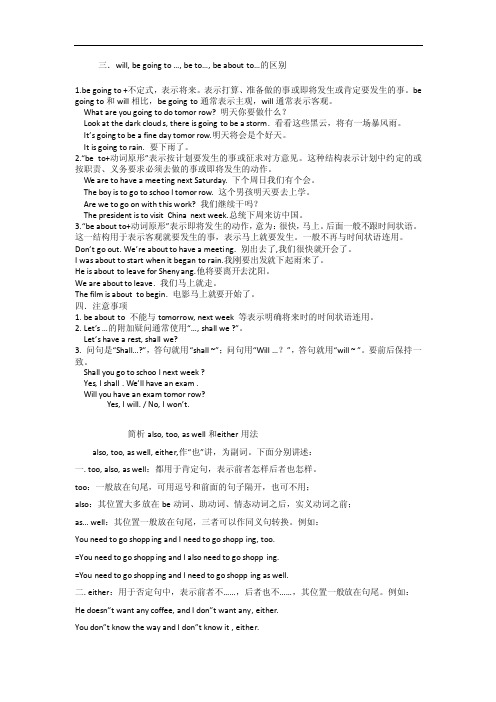
三.will, be goingto …, be to…, be aboutto…的区别1.be goingto +不定式,表示将来。
表示打算、准备做的事或即将发生或肯定要发生的事。
be goingto和wil l相比,be goingto通常表示主观,will通常表示客观。
What are you goingto do tomorr ow? 明天你要做什么?Look at the dark clouds, thereis goingto be a storm.看看这些黑云,将有一场暴风雨。
It’s goingto be a fine day tomorr ow.明天将会是个好天。
It is goingto rain. 要下雨了。
2.“be to+动词原形”表示按计划要发生的事或征求对方意见。
这种结构表示计划中约定的或按职责、义务要求必须去做的事或即将发生的动作。
We are to have a meetin g next Saturd ay. 下个周日我们有个会。
The boy is to go to school tomorr ow. 这个男孩明天要去上学。
Are we to go on with this work? 我们继续干吗?The presid ent is to visitChinanext week.总统下周来访中国。
3.“be aboutto+动词原形”表示即将发生的动作,意为:很快,马上。
后面一般不跟时间状语。
这一结构用于表示客观就要发生的事,表示马上就要发生。
一般不再与时间状语连用。
Don’t go out. We’re aboutto have a meetin g. 别出去了,我们很快就开会了。
I was aboutto startwhen it beganto rain.我刚要出发就下起雨来了。
2023年初中英语语法考试:词性分类12种及词性转换七大规则
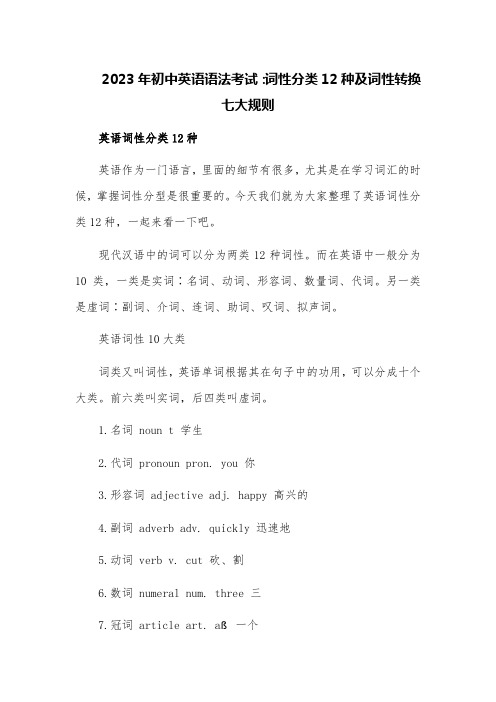
2023年初中英语语法考试:词性分类12种及词性转换七大规则英语词性分类12种英语作为一门语言,里面的细节有很多,尤其是在学习词汇的时候,掌握词性分型是很重要的。
今天我们就为大家整理了英语词性分类12种,一起来看一下吧。
现代汉语中的词可以分为两类12种词性。
而在英语中一般分为10类,一类是实词∶名词、动词、形容词、数量词、代词。
另一类是虚词∶副词、介词、连词、助词、叹词、拟声词。
英语词性10大类词类又叫词性,英语单词根据其在句子中的功用,可以分成十个大类。
前六类叫实词,后四类叫虚词。
1.名词 noun t 学生2.代词 pronoun pron. you 你3.形容词 adjective adj. happy 高兴的4.副词 adverb adv. quickly 迅速地5.动词 verb v. cut 砍、割6.数词 numeral num. three 三7.冠词 article art. aß一个8.介词 preposition prep. at 在...9.连词 conjunction conj. and 和10.感叹词 interjection interj. oh 哦2 具体英语词性介绍及用法名词在英语中有些名词可以加"'s"来表示所有关系,带这种词尾的名词形式称为该名词的所有格,如∶ a teacher's book。
名词所有格的规则如下∶1)单数名词词尾加"'s",复数名词词尾没有s,也要加"'s",如the boy's bag男孩的书包,men's room 男厕所。
2)若名词已有复数词尾-s ,只加"'",如∶ the workers' st∶ers' struggle工人的斗争。
3)凡不能加"'s"的名词,都可以用"名词+of +名词"的结构来表示所有关系,如∶ the title oföthe song 歌的名字。
词性转换 (2)

1.名词变形容词difference—— different 不同、差别—不同的intelligence —— intelligent 智力—聪明的、智力高的importance —— important 重要性—重要的excellence— excellent 优秀、杰出—极好的patient—patience 有耐心的——耐心,耐力agriculture—agricultural 农业—农业的culture—cultural 文化—文化的nature—natural 自然—自然的region—regional 地区—地区的season —— seasonal 季节—季节性noise —noisy 噪音—吵闹的health– healthy 健康—健康的sense—sensible 感官—有感觉的、敏感的danger—dangerous 危险—危险的drama—dramatic 戏剧—戏剧的、戏剧性的ill—illness 生病的—疾病sick—sickness 生病的——疾病considerate — consider 考虑、认为—考虑周到的experience—experienced 经验(不可数名词)--有经验的impatient ( adj.)—patience ( n.)耐心的—不耐心的—耐心、忍耐力scientific(adj.)—science(n.)—scientist(n.)科学的-科学-科学家electricity (n.)—electrical (adj.)—electric(adj.)电—与电有关的—电的electrical appliances 电器设备/ electric+电器safety ( n.)—safe ( adj.)—safely (adv.)安全-安全的-安全地person ( n.)—personal ( adj.)—personally (adv.)人—个人的、私人的—亲自care—careful—carefully 注意、小心—小心的—小心地reality--real—really 事实—真的、真正的—真正地truth—true—truly 真相—真实的—真正地、确实地chemistry ( n.) --chemist ( n.)—chemical ( adj.) 化学——化学家 ------化学的、化学物质scene场景、布景 , scenery景色、风光,scenic景色优美的2.动词变名词explain—explanation 解释repeat—repetition 重复describe—description 描述discuss—discussion 讨论pollute—pollution 污染organize—organization 组织suggest—suggestion(s) 建议advise—advice 建议weigh ( v.)—weight ( n.)称重量——重量e.g. How much do you weigh? I weigh +数量 kg.produce —product 生产--产品bake( v.)烘、烤—baker面包师( n.)—bakery面包店( n.)lead( v.)领导、倡导—leader( n.)领导者、权威breath—breathe 呼吸manage—manager 管理—经理own—owner 拥有—主人fight—fighter 战斗—战士design—designer 设计—设计师locate—location 位于—位置be located in … 位于……communicate—communication 沟通enter—entrance 进入—入口elect—election 选举、推选(精选)edit—editor 编辑、校定—编辑、编者vote—voter 投票选举—投票人、选举人suggest—suggestion(s) 建议—建议(可数名词)decide—decision 下决心、作决定—决心、决定conclude—conclusion 结束—结论consider—consideration 考虑、认为print—printer 印刷—打印机educate—education教育—教育type—typewrite--typist打字—打字机—打字员wait—waitress/waiter等待—女服务员/男服务员act ( v.)—actor ( n.)—actress ( n.) 表演—女演员—男演员add—addition 加-增加(in addition另外)end—ending 结束--结局begin—beginning 开始—开端warn—warning 警告---警告3.形容词变副词usual—usually 通常的—通常、平常final—finally 最后的—最后careful—carefully 小心的—小心地beautiful—beautifully 漂亮的—漂亮地certain—certainly =of course 当然heavy—heavily 重的—重地possible(impossible)—possibly 可能的(不可能的)--可能tidy/untidy----tidily/untidily (不)干净的—(不)干净地lucky—luckily 幸运的—幸运地sudden—suddenly 忽然—忽然地France—French—Frenchman (Frenchmen)法国---法国的、法语---法国人attract( v.)—attraction( n.)—attractive( adj.)吸引—名胜—有吸引力的live ( v.)—life ( n.)—keep alive ( adj.)—( adj.)living things生活——生命(lives)—保持活着—活着的生物die ( v.)—death ( n.)— dead( adj.)死—死亡---死的e.g. My dog died yesterday.My dog has been dead for two days.4.反义词appear—disappear 出现—消失patient —impatient 耐心的—不耐心的possible—impossible 可能的—不可能的able—unable能够——不能comfortable—uncomfortable 舒适的、舒服的---不舒适的comfortable (adj.)— comfortably( adv.) 舒适的---舒适地Revision1different(副词)(名词) 2frustrate(名词) 3 quickly (形容词)4speak(形容词) 5pronounce(名词) 6slow(副词)7learn(名词) 8impress(名词) 9if not(近义词)10easy(副词) 11lose(形容词) 12agree(名词)(反义词)13develop名词) 14important(反义词)(名词) 15terrify(形容词)16chat(现在分词) 17day(形容词) 18die(名词)(形容词)19he(反身代词) 20decide(名词) 21pride(形容词)22surprise(形容词) 23shelf(复数) 24sleep(形容词)25important(名词) 26success(动词) 27care(形容词)28medicine(形容词) 29tie(现在分词) 30confident(名词)31permit(名词) 32listen(名词) 33knowledge(形容词)34downstairs(反义词) 35pain(形容词) 36help(形容词)37writer(同义词) 38possible(副词)(反义词) 39drop(现在分词))40final(副词) 41worry(形容词) 42own(名词)43happy(反义词) 44noise(形容词) 45wind(形容词)46honest(反义词)(名词) 47sleep(形容词) 48gentle(副词)49photograph(形容词) 50interest(形容词) 51suggest(名词)52energy(形容词) 53taste(形容词) 54fry(形容词)55main(副词) 56education(形容词)(动词) 57peace(形容词)58trek(现在分词) 59fascinate(形容词) 60tourist(形容词)61live(形容词) 62general(形容词) 63translate(名词)64sail(名词) 64home(形容词) 65commit(名词)66organize(名词) 67please(形容词)(名词) 68donate(名词)69special(副词) 70invent(名词) 71operate(名词)72salt(形容词) 73mix(名词) 74create(形容词)75act(名词)(形容词) 76wood(形容词) 77popular(名词)78fool(形容词) 79wonder(形容词) 80knife(复数)81crowd(形容词) 82shine(形容词) 83beautiful(名词)84true(名词)(副词) 85village(名词) 86strong(副词)87play(形容词) 88spot(形容词) 89weigh(名词)90suit(形容词) 91roof(复数) 92recent(副词)93busy(名词)1pollute(形容词名词) 2build(名词) 3fly(名词) 4probable(副词)5interview(名词) 6science(名词) 7human(复数)8tooth(复数)9possible(反义词) 10both(反义词) 11fail(名词) 12press(名词)13craze(形容词) 14free(名词) 15hero(复数)16luck(形容词)(副词)17own(名词) 18thin(比较级) 19decide(名词)20danger(形容词)21fat(比较级) 22collect(人/物名词) 23wait(名词)24polite(反义词)25normal(副词) 26behave(名词) 27break(形容词)28polite(副词)29care(形容词、副词) 30person(形容词) 31mouse(复数)32child(复数)33clear(副词) 34win(名词) 35drive(名词) 36simpe(副词)37brave(副词)38nature(副词)39wake(形容词)40cross(介词)41baby(复数)42 little(比较级,最高级)43shop(现在分词)44one(副词)45health(形容词)46interview(名词)47try(三单) 48good(比较级,最高级)49same(反义词)50different(名词)51healthy(反义词)52foot(复数)53tooth(复数)54ill(名词)55early(比较级,最高级)56tradition(形容词)57west(形容词)58important(名词)59balance(形容词)60late(反义词)61babysit(现在分词)62plan(现在分词)63nature(形容词)64forget(现在分词)65ninety(序数词)66far(比较级最高级)67worry(形容词)68who(宾格所有格)69invite (名词)70care(形容词副词) 71use(形容词)72begin(现在分词)73safe(名词)74danger(形容词)75salt(形容词)76visit(名词)77wet(比较级最高级)78play(名词) 79internation(形容词)80usual(反义词,副词)81tour(名词)82know(形容词)83person(形容词)84act(名词形容词)85read(名词)86teach(名词)87sit(名词)88with(反义词)89perfom(名词)90music(形容词名词)91love(形容词)92center(形容词)1Library(名词)2enjoy(形容词)3hungry(名词)4beautifui(名词)5leaf(复数) 6report(名词)7wait(名词)8thief(复数)9young(名词)10child(形容词)11teach(名词)12clean(名词) 13read(名词)14rain(形容词)15wind(形容词) 16sun(形容词)17cloud(形容词)18snow(形容词)19bad(比较级最高级)20terrible(副词)21scarf(复数) 22describe(名词)23high(名词)24thin(比较级最高级)25sing(名词)26potato(复数) 27decide(名词)28loud(副词)。
2023届高考英语复习之语法透析:词性转换(构词法)课件

act → active 积极的;活跃的 ive effect → effective 有效的;生效的
attract → attractive 有吸引力的 impress → impressive 给人印象深刻的
02 考点精析
名词、动词转化 为形容词后缀ous
direct → indirect 间接的
02 考点精析 ir-
前缀 mis-
un
regular → irregular 不规则的 responsible → irresponsible 不负责任的
lead → mislead 误导 understand → misunderstand误解 usual → unusual 不寻常的 willing → unwilling 不愿意的 happy → unhappy 不高兴的 known → unknown 不出名的
02 考点精析
动词转化为名词 后缀ance/ence
appear → appearance 出现;外貌 perform → performance 表演;节目 exist → existence 存在;生存 prefer → preference 偏爱 refer → reference 参考;查阅 guide → guidance 指引;指导
doubt → doubtful 怀疑的 forget → forgetful 健忘的 harm → harmful 有害的 hope → hopeful 有希望的 peace → peaceful 和平的
02 考点精析
名词、动词转化 为形容词后缀
scare → scared 感到恐惧的 -ed confuse → confused 感到困惑的
高中词性及词形转换
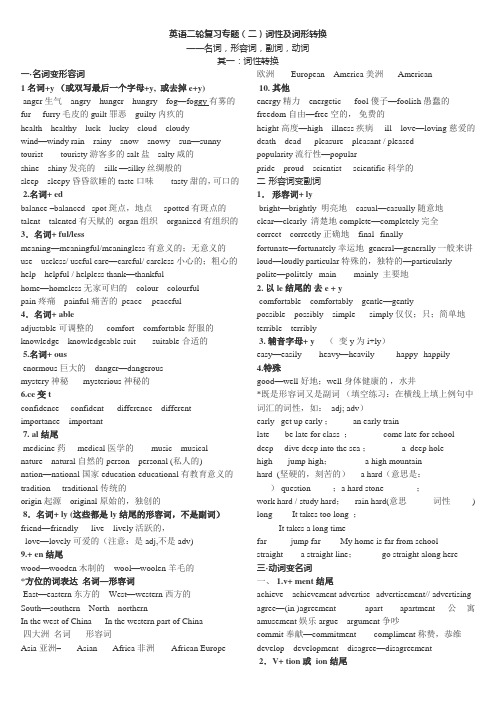
英语二轮复习专题(二)词性及词形转换——名词,形容词,副词,动词其一:词性转换一·名词变形容词1名词+y (或双写最后一个字母+y, 或去掉e+y)anger 生气---angry hunger---hungry fog—foggy有雾的fur----furry 毛皮的guilt 罪恶---guilty 内疚的health---healthy luck---lucky cloud---cloudy wind—windy rain---rainy snow---snowy sun—sunny tourist------touristy 游客多的salt 盐-- salty 咸的shine---shiny 发亮的silk —silky 丝绸般的sleep---sleepy 昏昏欲睡的taste 口味------tasty 甜的,可口的2.名词+ edbalance –balanced spot 斑点,地点----spotted 有斑点的talent---talented 有天赋的organ组织---organized 有组织的3.名词+ ful/lessmeaning—meaningful/meaningless 有意义的;无意义的use---useless/ useful care—careful/ careless 小心的;粗心的help---helpful / helpless thank—thankful home—homeless 无家可归的colour---colourfulpain 疼痛---painful 痛苦的peace -- peaceful4.名词+ ableadjustable 可调整的comfort---comfortable舒服的knowledge---knowledgeable suit -----suitable 合适的5.名词+ ousenormous 巨大的danger—dangerousmystery 神秘-----mysterious 神秘的6.ce 变 tconfidence----confident difference---different importance---important7. al 结尾medicine 药----medical 医学的music---musical nature---natural 自然的person---personal (私人的) nation—national 国家education-educational有教育意义的tradition----traditional 传统的origin起源---original 原始的,独创的8.名词+ ly (这些都是ly结尾的形容词,不是副词)friend—friendly live---lively 活跃的,love—lovely 可爱的(注意:是adj,不是adv)9.+ en 结尾wood—wooden 木制的wool—woolen 羊毛的*方位的词表达名词—形容词East—eastern东方的West—western西方的South—southern North---northernIn the west of China In the western part of China四大洲名词-----形容词Asia 亚洲–---- Asian Africa 非洲----- African Europe 欧洲----- European America 美洲-----American10. 其他energy精力---energetic fool 傻子—foolish 愚蠢的freedom 自由—free 空的,免费的height 高度—high illness 疾病--- ill love—loving 慈爱的death---dead pleasure---pleasant / pleasedpopularity 流行性—popularpride---proud scientist----scientific 科学的二·形容词变副词1.形容词+ lybright—brightly 明亮地casual—casually 随意地clear—clearly 清楚地complete—completely 完全correct---correctly 正确地final--finally fortunate—fortunately幸运地general—generally 一般来讲loud—loudly particular 特殊的,独特的—particularly polite—politely main------mainly 主要地2. 以le 结尾的去e + ycomfortable---comfortably gentle—gentlypossible---possibly simple ----simply 仅仅;只;简单地terrible---terribly3. 辅音字母+ y (变y为i+ly)easy—easily heavy—heavily happy--happily4.特殊good—well好地;well 身体健康的,水井*既是形容词又是副词(填空练习:在横线上填上例句中词汇的词性,如:adj; adv)early get up early ;____ an early train____late be late for class ;___ come late for school____ deep dive deep into the sea ;____ a deep hole_____ high jump high;______ a high mountain________ hard (坚硬的,刻苦的) a hard(意思是:___) question_____;a hard stone_______ ;work hard / study hard;___rain hard(意思______词性_____) long It takes too long ;_____It takes a long time_______far jump far ___My home is far from school _____ straight a straight line;_____go straight along here____ 三·动词变名词一、1.v+ ment 结尾achieve---achievement advertise--advertisement// advertising agree—(in )agreement apart------apartment 公寓amusement 娱乐argue---argument争吵commit奉献—commitment compliment 称赞,恭维develop---development disagree—disagreement2.V+ tion或ion 结尾attract吸引—attraction(s) conclude—conclusion 结论compete—competition 竞争,比赛discuss—discussion 讨论educate-----education describe—description描写,描绘suggest-建议,暗示-suggestion solve解决-solution 解决方法 3.V+ ance 结尾appear—appearance 外,出现perform--performance 演出4.V+ ing 结尾bathe 洗澡---bathing end 结束----ending 结尾,结局train 训练---training mean---meaning 意义say-----saying 谚语5.V+ 其他Beg(乞讨)—beggar 乞丐behave 行为,举止----behavior know---knowledge fly—flight 飞行heat 加热---heat 热量hit 撞击------hit 轰动一时的人或物,碰撞mix 混合-----mixture 混合物press 按,压—pressure 压力sit-----seat 座位succeed-- successtour 在-----旅游,在-----作巡回演出直接+地点,如:tour China ---tourism旅游/ tourist 游客其二·词形变化除了上述词性转换,一个单词的词形还可以通过以下方式来发生改变(顺便词性或词义也发生了变化):一·名词的单复数变形1.规则的可数名词的复数变化:1).一般情况加s :book-- books mouth---mouths house---houses girl---girls2).以s 、sh 、ch 、x结尾的加es :class--- classes box----boxes match----matches3).辅音字母+ y结尾的变y为i加es:city---cities country----countries party----parties factory----factories 4).以o 结尾的词+es的只有以下词:heroes Negroes;tomatoes;potatoes5) .以f,fe 结尾的变f或fe为v +es :thief wife life knife wolf half leaf2. 不规则的变化1).man—men, woman—women, tooth—teeth, foot—feet, goose—geese , child—children, mouse—mice, phenomenon---phenomena, crisis---crises; criterion---criteria 2).单复数相同: sheep, deer, fish, Chinese, Japanese , Swiss, craft, means, series, species3).以man, woman 修饰名词构成合成词时,两个词都变化.a man servant—three men servants 但boy与girl不要变化a girl student---three girl students4) 合成词的单数变复数,一般在词尾加-s/-es,如有名词作为中心词,则加在该名词后。
高中英语2025届高考常考词性变化(形容词和副词)
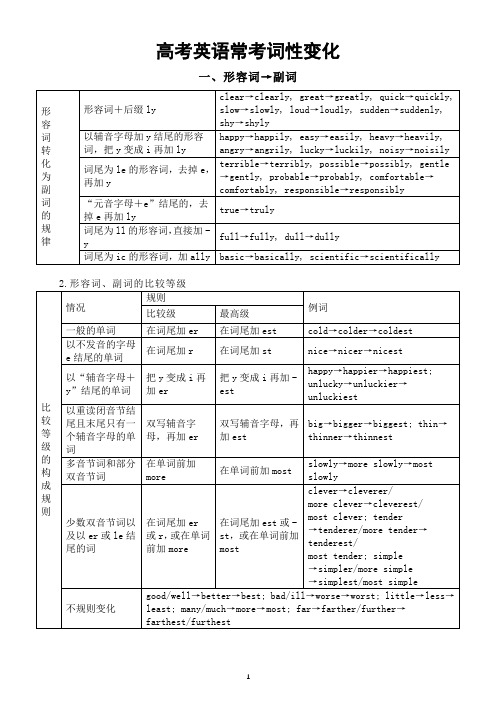
高考英语常考词性变化二、名词转换为形容词(1)ful,less结尾的形容词;aim→aimless 无目标的beauty→beautiful 美丽的breath→breathless 上气不接下气的care→careful→careless 小心的/粗心的color→colorful→colorless 多彩的/无色的cheer→cheerful 高兴的doubt→doubtful→doubtless 可疑的,不确定的/无疑的end→endless 无休止的faith→faithful 忠实的fear→fearful 可怕的home→homeless 无家可归的harm→harmful→harmless 有害的/无害的hope→hopeful→hopeless 抱有希望的/无望的help→helpful→helpless 有帮助的,愿意帮忙的/无助的job→jobless 无工作的joy→joyful 高兴的meaning→meaningful 有意义的mind→mindless 不留神的,愚蠢的peace→peaceful 和平的pain→painful→painless 痛苦的/不痛的power→powerful→powerless 强有力的/无力的price→priceless 珍贵的,无价的speech→speechless 说不出话的self→selfless 无私的success→successful 成功的thank→thankful 感激的tire→tireless 不知疲倦的use→useful 有用的wire→wireless 无线的①[2019·全国卷Ⅰ]Learning English as a second language can bea painful experience.把英语作为第二语言学习可能是一段痛苦的经历。
②[2017·北京高考]Jane moved aimlessly down the treelined street, not knowing where she was heading.简漫无目的地沿着绿树成荫的街道往前走,不知道要去哪里。
英语词性转换大全
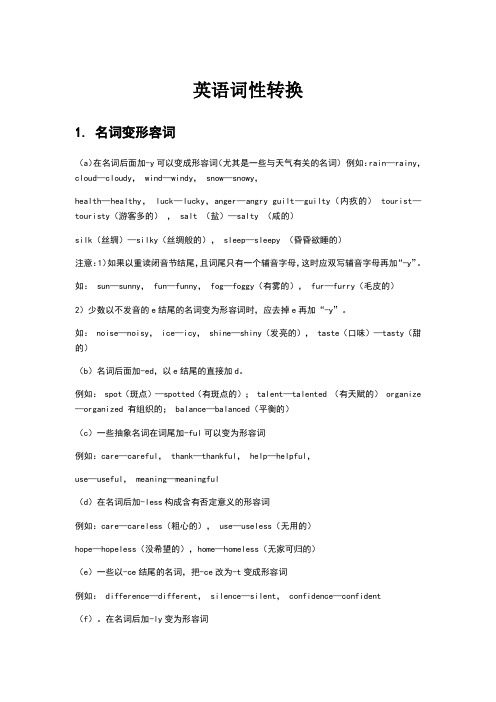
英语词性转换1. 名词变形容词(a)在名词后面加-y可以变成形容词(尤其是一些与天气有关的名词)例如:rain—rainy,cloud—cloudy, wind—windy, snow—snowy,health—healthy, luck—lucky,anger—angry guilt—guilty(内疚的) tourist—touristy(游客多的), salt (盐)—salty (咸的)silk(丝绸)—silky(丝绸般的), sleep—sleepy (昏昏欲睡的)注意:1)如果以重读闭音节结尾,且词尾只有一个辅音字母,这时应双写辅音字母再加“-y”。
如: sun—sunny, fun—funny, fog—foggy(有雾的), fur—furry(毛皮的)2)少数以不发音的e结尾的名词变为形容词时,应去掉e再加“-y”。
如: noise—noisy, ice—icy, shine—shiny(发亮的), taste(口味)—tasty(甜的)(b)名词后面加-ed,以e结尾的直接加d。
例如: spot(斑点)—spotted(有斑点的); talent—talented (有天赋的) organize —organized 有组织的; balance—balanced(平衡的)(c)一些抽象名词在词尾加-ful可以变为形容词例如:care—careful, thank—thankful, help—helpful,use—useful, meaning—meaningful(d)在名词后加-less构成含有否定意义的形容词例如:care—careless(粗心的), use—useless(无用的)hope—hopeless(没希望的),home—homeless(无家可归的)(e)一些以-ce结尾的名词,把-ce改为-t变成形容词例如: difference—different, silence—silent, confidence—confident(f)。
词性变化(形容词 副词 转化)

三.will, be going to …, be to…, be about to…的区别1.be going to +不定式,表示将来。
表示打算、准备做的事或即将发生或肯定要发生的事。
be going to和will相比,be going to通常表示主观,will通常表示客观。
What are you going to do tomorrow? 明天你要做什么?Look at the dark clouds, there is going to be a storm. 看看这些黑云,将有一场暴风雨。
It’s going to be a fine day tomorrow.明天将会是个好天。
It is going to rain. 要下雨了。
2.“be to+动词原形”表示按计划要发生的事或征求对方意见。
这种结构表示计划中约定的或按职责、义务要求必须去做的事或即将发生的动作。
We are to have a meeting next Saturday. 下个周日我们有个会。
The boy is to go to school tomorrow. 这个男孩明天要去上学。
Are we to go on with this work? 我们继续干吗?The president is to visit China next week.总统下周来访中国。
3.“be about to+动词原形”表示即将发生的动作,意为:很快,马上。
后面一般不跟时间状语。
这一结构用于表示客观就要发生的事,表示马上就要发生。
一般不再与时间状语连用。
Don’t go out. We’re about to have a meeting. 别出去了,我们很快就开会了。
I was about to start when it began to rain.我刚要出发就下起雨来了。
He is about to leave for Shenyang.他将要离开去沈阳。
初中英语词性转换规律总结与应试技巧
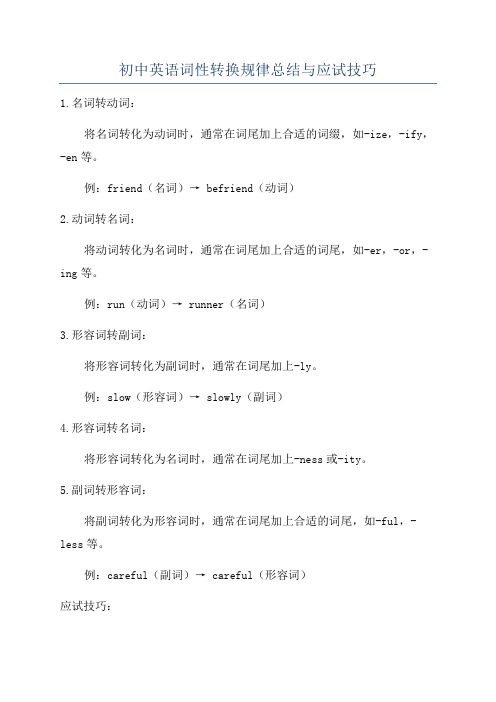
初中英语词性转换规律总结与应试技巧
1.名词转动词:
将名词转化为动词时,通常在词尾加上合适的词缀,如-ize,-ify,-en等。
例:friend(名词)→ befriend(动词)
2.动词转名词:
将动词转化为名词时,通常在词尾加上合适的词尾,如-er,-or,-ing等。
例:run(动词)→ runner(名词)
3.形容词转副词:
将形容词转化为副词时,通常在词尾加上-ly。
例:slow(形容词)→ slowly(副词)
4.形容词转名词:
将形容词转化为名词时,通常在词尾加上-ness或-ity。
5.副词转形容词:
将副词转化为形容词时,通常在词尾加上合适的词尾,如-ful,-less等。
例:careful(副词)→ careful(形容词)
应试技巧:
1.注意词根词缀的变化,有时候词性转换还会伴随着词根的变化。
2.大多数常见的词性转换规律都已掌握,但仍需多练习和记忆,积累的是经验。
3.定期回顾已学习过的词性转换规律,形成记忆,提高应对考试的能力。
4.在考试前,可以查阅常见的词性转换规律,熟悉一些常考的单词词性转换,增加应对考试的信心。
英语形容词和副词的词性转换与用法

英语形容词和副词的词性转换与用法英语形容词和副词在句子中扮演着重要的角色,它们用来描述名词或动词的特征和方式。
本文将介绍英语形容词和副词的词性转换以及它们的常见用法。
形容词和副词的基本概念形容词(Adjective)是用来修饰名词或代词的词语,表示事物的性质、特征或状态。
例如,“beautiful”(美丽的)和“interesting”(有趣的)就是形容词。
副词(Adverb)用来修饰动词、形容词、副词等,表示一种动作的方式、程度或特点。
例如,“quickly”(快速地)和“very”(非常)就是副词。
形容词和副词的词性转换在英语中,形容词和副词之间常常存在词性转换的关系,形容词可以转换为副词,副词也可以转换为形容词。
形容词转副词形容词转换为副词的一般规则是在词尾加上“-ly”。
例如:- Beautiful(美丽的)→ Beautifully(美丽地)- Quick(快速的)→ Quickly(快速地)- Careful(小心的)→ Carefully(小心地)需要注意的是,并不是所有的形容词都可以直接转换为以“-ly”结尾的副词,有些形容词的副词形式并不规则,需要单独记忆。
副词转形容词副词转换为形容词的一般规则是去掉词尾的“-ly”。
例如:- Slowly(慢慢地)→ Slow(慢的)- Clearly(清楚地)→ Clear(清楚的)- Loudly(大声地)→ Loud(响亮的)同样地,有些副词的形容词形式也不规则,需要单独记忆。
形容词和副词的常见用法形容词和副词在句子中的用法有以下几种情况:1. 修饰名词:形容词可以直接修饰名词,用来描述名词的特征或属性。
例如,“a beautiful flower”(一朵美丽的花)。
2. 修饰代词:形容词可以修饰代词,用来描述代词的特征。
例如,“she is kind”(她很友善)。
3. 修饰动词:副词可以修饰动词,用来描述动作的方式或程度。
例如,“He runs quickly”(他跑得很快)。
形容词和副词的转化规则分析

形容词和副词的转化规则分析形容词和副词是语言中常见的两种词性,它们在句子中起着描述和修饰的作用。
虽然形容词和副词有着不同的词性,但它们之间却存在一定的转化规则。
本文将对形容词和副词的转化规则进行详细分析。
一、形容词转化为副词形容词转化为副词是一种常见的转化方式,转化规则主要有以下几种:1. 形容词以-e结尾,变为副词时,去掉结尾的-e,再加上-y。
例如:- True(形容词)→ Truly(副词)- Late(形容词)→ Lately(副词)2. 形容词以-y结尾,变为副词时,将-y变为-i,再加上-ly。
例如:- Happy(形容词)→ Happily(副词)- Easy(形容词)→ Easily(副词)3. 形容词以-le结尾,变为副词时,将-le变为-ly。
例如:- Gentle(形容词)→ Gently(副词)- Subtle(形容词)→ Subtly(副词)4. 形容词以-ic结尾,变为副词时,将-c变为-cally。
例如:- Specific(形容词)→ Specifically(副词)- Economic(形容词)→ Economically(副词)5. 形容词以-ly结尾,本身已经是副词,无需进行转化。
例如:- Friendly(形容词/副词)- Likely(形容词/副词)需要注意的是,虽然大部分的形容词都可以通过上述规则转化为副词,但仍有个别形容词转化规则并不适用。
二、副词转化为形容词副词转化为形容词的规则相对较少,主要包括以下几种情况:1. 一些副词本身在句中就可用作形容词,不需转化。
例如:- Fast(副词/形容词)- Hard(副词/形容词)2. 将副词与连字符“-”结合,形成形容词。
例如:- Well(副词)→ Well-known(形容词)- High(副词)→ High-speed(形容词)总结起来,形容词和副词的转化规则在语言中起到了丰富词汇的作用,使得语言更加准确、生动。
英语词性转换(形容词转化为副词的一般规则)

英语词性转换——形容词转化为副词的一般规则形容词变副词通常是加ly,其变化有规律可循,请记住以下口诀:一般直接加,―元(e)去e加,―辅(y)改i加,le结尾e改y。
分别举例如下:quick---quickly; true---truly; happy---happily; possible----possibly 具体规则如下:1) .一般情况下直接加―ly,如:quick---quickly; polite---politely; sad---sadly; immediate---immediately; recent---recently2). 少数以e结尾的形容词,要去掉e再加-ly。
如:true-truly; due-duly绝大多数辅音字母加e结尾的形容词直接加-ly。
如:polite-politely; wide-widely; wise-wisely; nice-nicely3). 以―个y结尾的,且读音为/ i /,先将―y改成―i,再加―ly,如:happy---happily; heavy---heavily; angry---angrily; busy---busily但是如果读音为/ ai /,直接加ly,如:dry-dryly; sly-slyly; shy---shyly4).以ic结尾的词,加ally,如:economic---economically; basic---basically; scientific---scientifically; automatic---automatically; energetic---energetically5).以辅音字母加le结尾时,去e加y,如:simple---simply; considerable---considerably; terrible---terribly; gentle---gently; possible---possibly; probable---probably; incredible---incredibly元音字母加le时加ly,如:sole-solely。
英语词汇 词性转换——形容词变副词

1.形容词+ ly(直接加,不需要变形)eventual—eventually最后地,终于地final—finally 最后地,终于地brief—briefly 简单地,简要地serious—seriously严肃地,认真地chemical—chemically化学地fluent—fluently 流利地smooth—smoothly 顺利地,平坦地hopeful—hopefully满怀希望地frequent—frequently频繁地actual—actually 事实上地similar—similarly 相似地bad—badly糟糕地narrow—narrowly 狭隘地,狭窄地bright—brightly 明亮地casual—casually 随意地clear—clearly 清楚地correct—correctly 正确地general—generally 一般来讲loud—loudly大声地particular—particularly特殊地,独特地proper —properly合适地,恰当地main —mainly 主要地most 多数—mostly 多半,大多数normal—normally 正常地quick—quickly迅速地quiet—quietly 轻轻地,安静地real—really 真正地recent —recently 最近;近来sad—sadly 悲伤地slow —slowly缓慢地special—specially 专门,特殊地specific —specifically 特定地,明确地strong—strongly 坚决地,强烈地sudden—suddenly突然usual—usually通常地fair—fairly 公平地,相当地,非常地2. 以(l)e 结尾的去e + ycomfortable---comfortably舒适地gentle—gently温柔地,绅士地possible---possibly可能地simple ----simply 仅仅;只;简单地terrible---terribly糟糕地reasonable— reasonably 合理地probable— probably 很有可能地incredible—incredibly 难以置信地full— fully 完全地,全部地dull—dully 迟钝地,呆滞地true—truly 真实地whole— wholly完全地3.以-e结尾,保留-e,直接+lyrare—rarely 罕见地,稀有地mere--merely仅仅,只=onlyfortunate—fortunately幸运地entire—entirely 完全地complete—completely 完全地extreme-extremely 极度地,极其地absolute-absolutely 绝对地polite—politely 有礼貌地immediate—immediately 立即地,马上地safe—safely 安全地relative--relatively 相对地,比较地approximate--approximately 大约wise— wisely 明智地nice— nicely 很好地close— closely 亲密地,靠近地(close 也可作adv.)3. 辅音字母+ y 变ilyeasy—easily 容易地heavy—heavily 沉重地happy—happily 开心地hungry—hungrily 饥饿地healthy—healthily 健康地lucky—luckily 幸运地noisy—noisily 嘈杂地dry—dryly 干燥地shy—shyly 害羞地sly—slyly 狡猾的4. 以ic结尾的+allyenergetic— energetically 充满活力地automatic—automatically 自动地scientific— scientifically 科学地economic—economically 经济地basic—basically 基础地,基本地public— publicly 公共地。
形容词和副词的转化规则

形容词和副词的转化规则形容词和副词是英语中常见的词性,它们在句子中用于修饰名词或者动词,起到描述和限定的作用。
形容词和副词之间有一定的转化规则,可以通过在词根后面加上后缀来实现转化。
本文将介绍形容词和副词的转化规则,并给出一些例子来帮助读者更好地理解。
一、形容词转化为副词在将形容词转化为副词的过程中,通常需要在词根后面加上“-ly”的后缀。
这个后缀表示副词的意义,使形容词发挥修饰动词的作用。
例如:1. 形容词:quick(快速的) --> 副词:quickly(快速地)2. 形容词:happy(快乐的) --> 副词:happily(快乐地)3. 形容词:careful(小心的) --> 副词:carefully(小心地)需要注意的是,有些形容词的副词形式与其形容词形式相同,例如:1. 形容词:fast(快速的) --> 副词:fast(快速地)2. 形容词:late(迟的) --> 副词:late(迟地)二、副词转化为形容词副词转化为形容词时,一般需要在副词前面加上“-en”或者“-ed”的后缀。
这个后缀表示形容词的意义,用来修饰名词。
例如:1. 副词:quickly(快速地) --> 形容词:quickened(加速的)2. 副词:loudly(大声地) --> 形容词:loudened(大声的)3. 副词:easily(容易地) --> 形容词:easened(容易的)需要注意的是,有些副词的形容词形式与其副词形式相同,例如:1. 副词:hard(努力地) --> 形容词:hard(努力的)2. 副词:fast(快速地) --> 形容词:fast(快速的)三、形容词和副词相同形式的情况有一些形容词和副词的形式是相同的,这些词通常用于描述状态和感受,没有副词的形态变化。
例如:1. 形容词和副词:happy(快乐的/快乐地)2. 形容词和副词:sad(伤心的/伤心地)3. 形容词和副词:lonely(孤独的/孤独地)需要注意的是,这种情况只适用于单音节和部分双音节形容词和副词。
初中英语词性变化归纳

初中英语词型转换归纳一、动词的变形:1.变名词:(1)+ ment achieve---achieve ment成就advertise--- advertise ment/ advertis ing 广告(dis)agree---(dis)agree ment (不)同意apart--- apart ment 公寓amuse---- amuse ment 娱乐argue---argu ment 争吵commit—commit ment 奉献develop --- develop ment发展depart--- depart ment 局部equip ---equip ment装备,器材govern—govern ment政府manage---manage ment 经营管理compli ment称赞,恭维(2)+ tion/sionact---ac tion行为attract—attrac tion有吸引力的事或人compete—competi tion竞争,比赛educate-----educa tion教育describe—descrip tion 描写,描绘graduate—gradua tion毕业operate—opera tion手术organize----organiza tion组织instruct—instruc tion指导,介绍invent—inven tion (物)/invent or(人)发明invite—invita tion邀请pollute----pollu tion污染predict---predic tion预言pronounce ---pronuncia tion发音resolve -----resolu tion决心suggest --sugges tion建议solve -----solu tion解决方法collect-----collect ion 收藏conclude—conclu sion结论permit -----permis sion 允许decide----deci sion 决定express ----expres sion词语;表达方式discuss—discus sion讨论inspire---inspira tion灵感,鼓舞人心的(3)+ anceappear—appear ance外貌,出现perform----perform ance演出enter----entr ance(4)+ ingbathe ---bath ing 洗澡end ----end ing结尾,结局train ---train ing 培训mean ---- mean ing意义say-----say ing谚语build----- build ing 建筑物light-----light ing灯光find-----find ing发现meet---meet ing会议(5)+er/orfarm---farm er 农民teach---teach er 老师work---work er 工人report---report er 记者manage---- manage r 经理drive---- drive r 司机write---- write r 作家wait----wait er 服务员(男waitress(女)win---win ner 获胜者run----run ner 跑步者act---act or 演员(男)invent---invent or 发明家visit---visit or 参观者collect----collect or 收藏家(6)+uremix -----mixt ure 混合物press—press ure压力please---- (with) pleas ure 高兴fail----fail ure 失败(7)其他(动词---名词)behave ----behav ior 行为,举止know ---know ledge知识fly—flight 飞行sit-----seat 座位succe ed—succe ss成功tour---- tour ist游客die-----death 死weigh---weigh t重量act---activity 活动enter----entrance 入口2.变形容词:(1) +ing (指物) / ed(指人)surprise----surpris ing/surpris ed 吃惊的tire----tiri ng/tire d 疲惫的bore----bor ing/bore d 无聊的excite----excit ing/excit ed 兴奋的interest---- interest ing/ interest ed有趣的relax---- relax ing/relax ed 放松的disappoint---- disappoint ing/disappoint ed 失望的frustrate---- frustrat ing/ frustrate d沮丧的frighten---- frighten ing/ frighten ed 害怕的(2)其他:wake---a wake 醒着的sleep---a sleep (睡着的)sleep y (困倦的)live---a live (活着的,系动后,作表语) living (活着的,名词前,作定语)lively (生动的)二.名词的变形:1. 变形容词:(1)+yanger -----angr y 生气的hunger---hungr y 饥饿的fog—fog gy 有雾的fur----fur ry毛皮的guilt ---guilt y内疚的health---health y 健康的luck---luck y 幸运的cloud---cloud ywind—wind yrain---rain ysnow---snow ysun—sun nytourist------tourist y游客多的salt --- salt y咸的shine---shin y 发亮的silk—silk y丝绸般的sleep---sleep y 困倦的taste ------tast y 甜的noise---nois y 吵闹的(2)+ ed 或动词+ed/dbalance –balance d平衡的spot ----spot ted有斑点的talent-----talent ed 有天赋的organize--- organize d有组织的disgust---- disgust ed厌恶的offend---- offend ed 生气的crowd---- crowd ed拥挤的pollute--- pollut ed被污染的please---- please d(人) / pleas ant(物)高兴的endanger--- endanger ed 濒临灭绝的(3)+ ful / less(变反义)use--- use ful/ use less 有用的无用的care—care ful/ care less小心的;粗心的help---help ful/ help less 有助的无助的home—home less无家可归的color---color ful 五颜六色的pain ---pain ful痛苦的thank—thank ful充满感激的peace ---- peace ful平静的,宁静的play---play ful顽皮的,爱玩耍的wonder---wonder ful精彩的forget----forget ful 健忘的meaning—meaning ful有意义的(4)+ ableadjust--adjust able可调整的comfort---comfort able 舒适的knowledge---knowledge able知识渊博的suit ----suit able合适的enjoy---- enjoy able 高兴的(5)+ ousdanger—danger ous 危险的mystery -----myster ious 神秘的nerve----nerv ous 紧张的enorm ous 巨大的(6)ce 变tconfiden ce----confiden tdifferen ce---differen timportan ce----importan tsilen ce----silen t(7) +almedicine ----medic al医学的music---music al 音乐的nature---natur al 自然的person---person al 私人的nation—nation al国家的education---education al 有教育意义的tradition----tradition al传统的origin ---origin al 新颖的;独创的profession----- profession al 职业的,专业的(8)+ lyfriend---friend lylive---live ly活跃的,有生气的live---living 活着的(名词前,作定语)alive 活着的(系动后,作表语)love---love ly 可爱的(小孩)lov ing 慈爱的(老人)(9)+ enwood—wood en木制的wool—wool en羊毛的(10)方位词+erneast—east ernwest—west ernsouth—south ernnorth---north ern(11)四大洲:Asia–---- Asia n 亚洲Africa ----- Africa n非洲America -----America n美洲Europe -----Europe an 欧洲music----music ian 音乐家(12)其他:( 名词----形容词)energy ---energe tic精力充沛的athlete---athlet ic强健的scientist----scienti fic科学的fool—fool ish愚蠢的free dom—free 空的,免费的h e igh t—high 高的heat----hot 热的illness --- ill 生病的love—loving 慈爱的(老人) lovely(小孩)death---dead 死的pleasure---pleasant 物/ pleased人pride---proud 自豪的popularity---popular 受欢迎的length---long 长的courage----en courage v. 鼓励2.变名词:(1)+istart---art ist 艺术家tour---tour ist 旅行者violin---violin ist 小提琴手piano---pian ist 钢琴家science----scien tist 科学家terror---terror ist 恐怖分子三.形容词的变形:1. 变副词:(1)+ lybad—bad ly糟糕地bright—bright ly明亮地casual—casual ly随意地clear—clear ly清楚地complete—complete ly完全地correct---correct ly正确地final—final ly 最后fortunate—fortunate ly 幸运地general—general ly一般来讲loud—loud ly / a loud 大声地particular—particular ly 特别地polite—polite ly 有礼貌地proper ---proper ly 合适地main------main ly 主要地most ----most ly多半,大多数normal---normal ly正常地quick—quick ly 快地,迅速地quiet—quiet ly 轻轻地,安静地real—real ly 真地recent ----recent ly 最近;近来hard ---hard ly几乎不sad--sad ly 难过地slow---slow ly 慢慢地special—special ly专门,特殊地specific---specifical ly明确地strong—strong ly 坚决地,强烈地sudden—sudden ly 突然usual—usual ly 经常地careful---- careful ly 认真地successful--- successful ly 成功地wide---wide ly 广泛地safe---safe ly 安全地(2)以le结尾的,e 变ycomfortab le---comfortab ly 舒适地gent le----gent ly 轻柔地possib le---possib ly 可能地simp le ----simp ly仅仅;只;简单地terrib le---terrib ly 可怕地(3)辅音字母+ y变 ilyeasy—eas ily 容易地heavy— (rain) heav ilyhappy—happ ily 开心地lucky---luck ily 幸运地(4)特殊good—well好地true—truly 真正地2.变反义词:polite---im polite 无礼的possible---im possible 不可能的happy---un happy 不高兴的lucky---un lucky 不幸的usual--- (an) un usual 不寻常的expensive---in expensive 不贵的honest----dis honest 不诚实的regular---ir regular 不规则的3. 变名词(+ness)happy---happi ness 幸福ill---ill ness疾病busy ----busi ness 生意,事业sad---sad ness 悲伤4.其他: (形容词变名词)hot----h eat 热量high----heigh t 高度foreign---foreign er 外国人strange---strang er 陌生人village----- village r 村民safe---safe ty 安全difficult----difficult y 困难honest---- honest y 诚实popular---- popular itytrue---tru th 真相,事实dead---dea th 死亡free---free dom 自由四.名词---形容词—副词:beauty—beautiful—beautifullycare—careful —carefullycare—careless—carelesslydifference---different---differentlyhappiness—happy—happilyhunger—hungry--hungrilyhealth—healthy—healthilyluck—lucky—luckilynoise—noisy—noisilypride—proud—proudlysadness—sad—sadlysafety—safe—safelysilence—silent---silently 默默地success—successful—successfullytruth—true—trulyluck —(un)lucky—(un)luckilywonder—wonderful—wonderfully五.既是形容词又是副词:early get up early ;an earlytrainlate be late forclasscome latefor schooldeep dive deep into theseaa holedeep largehigh jump high;a highmountainhard a hard question;a hardstonework hard / studyhardrain hardlong It takes too longIt takes a long timefar jump farMy home is far from schoolstraight a straightlinego straight along here。
词性变化

一、名词变形容词(n.- adj.)1. 在名词后面加-y可以变成形容词(尤其是一些与天气有关的名词)。
例如:rain—rainy, cloud—cloudy, wind—windy, snow—snowy等。
1)如果名词以重读闭音节结尾,且词尾只有一个辅音字母,这时应双写词尾的辅音字母再加-y。
如:sun—sunny, fun—funny等。
2)少数以不发音的e结尾的名词变为形容词时,应去掉e再加-y。
例如:noise—noisy, ice—icy 等。
2. 一些抽象名词在词尾加-ful可以变为形容词。
例如:care—careful, thank—thankful, help—helpful, use—useful,beauty—beautiful等。
3. 一些表示国家的名词可以在词尾加-ese, -ish或-n构成表示国籍、语言的形容词。
例如:China—Chinese, England—English, America—American, India—Indian (其中注意Canada—Canadian)。
4.在名词后加-ous变为形容词。
例如:danger—dangerous等。
5. 在名词后加-ly变为形容词。
例如:friend—friendly, love—lovely等。
6.在名词后加-less构成含有否定意义的形容词。
例如:care—careless,use—useless,hope—hopeless,home—homeless等。
7. 一些以-ence结尾的名词,把ence改为ent变成形容词。
例如:difference—different, silence—silent等。
二、动词变名词(v.-n.)1.词形不变,词性改变。
例如:work, study, water, plant等可以用作动词,也可以用作名词。
2. 一些动词在词尾加上-er或-or之后就变成了表示“某一类人”的名词。
高考英语词性转换技巧

高考英语词性转换技巧英语词性转换是高考英语考试中的常见考点之一,掌握好词性转换技巧可以帮助学生在考试中取得良好的成绩。
下面是一些常用的词性转换技巧,供大家参考。
一、名词与形容词的转换1. 名词转形容词名词可以通过添加后缀形式变成形容词,常见的名词转形容词的后缀有-ful,-less,-able,-al,-ive等。
例如:- Care(名词)- Careful(形容词): 小心的- Help(名词)- Helpful(形容词): 有帮助的- Hope(名词)- Hopeless(形容词): 绝望的- Nation(名词)- National(形容词): 国家的2. 形容词转名词形容词可以通过添加后缀或变化词形方式变成名词,常见的方式有-ness,-ity,-ism等。
例如:- Happy(形容词)- Happiness(名词): 幸福- Good(形容词)- Goodness(名词): 善良- Free(形容词)- Freedom(名词): 自由- Popular(形容词)- Popularity(名词): 流行二、动词与名词的转换1. 动词转名词动词可以通过添加后缀或变化词形方式变成名词,常见的方式有-ing,-ment,-tion等。
例如:- Speak(动词)- Speaking(名词): 演讲- Develop(动词)- Development(名词): 发展- Reduce(动词)- Reduction(名词): 减少- Communicate(动词)- Communication(名词): 沟通2. 名词转动词名词可以通过动词化的方式变成动词。
例如:- Friend(名词)- Be-friend(动词): 交朋友- Paper(名词)- Paper(动词): 用纸覆盖三、形容词与副词的转换1. 形容词转副词形容词可以通过添加特定后缀变成副词,常见的后缀有-ly。
例如:- Quick(形容词)- Quickly(副词): 快速地- Loud(形容词)- Loudly(副词): 大声地- Easy(形容词)- Easily(副词): 容易地- Careful(形容词)- Carefully(副词): 小心地2. 副词转形容词副词可以通过去掉后缀或变化词形方式变成形容词。
词性转换翻译

词性转换翻译词性转换是英语语法中的一个重要概念,它指的是将一个单词从一种词性转变为另一种词性。
通常,词性转换是通过添加前缀、后缀、改变词形或使用不同的词根来完成的。
下面是一些常见的词性转换及其翻译例子。
1. 名词转动词名词可以通过加上动词缀-ize或-ify转化为动词。
例如:- Noun (名词): hospital (医院)- Verb (动词): hospitalize (住院)2. 形容词转动词形容词可以通过加上动词缀-en或-ify转化为动词。
例如:- Adjective (形容词): soft (柔软的)- Verb (动词): soften (变软)3. 动词转名词动词可以通过添加名词后缀-er或-or转化为名词。
例如:- Verb (动词): sing (唱歌)- Noun (名词): singer (歌手)4. 形容词转名词形容词可以通过添加名词后缀-ness或-ity转化为名词。
例如:- Adjective (形容词): happy (快乐的)- Noun (名词): happiness (快乐)5. 名词转形容词名词可以通过添加形容词后缀-al或-ous转化为形容词。
例如:- Noun (名词): music (音乐)- Adjective (形容词): musical (音乐的)6. 动词转形容词动词可以通过添加形容词后缀-ing或-ed转化为形容词。
例如:- Verb (动词): interest (感兴趣)- Adjective (形容词): interesting (有趣)7. 名词转副词名词可以通过添加副词后缀-ly转化为副词。
例如:- Noun (名词): quick (快)- Adverb (副词): quickly (快速地)8. 形容词转副词形容词可以通过添加副词后缀-ly转化为副词。
例如:- Adjective (形容词): careful (小心的)- Adverb (副词): carefully (小心地)词性转换在英语中非常常见,掌握这些转换规则可以帮助我们更好地理解和表达英语。
词性变化和词性转换
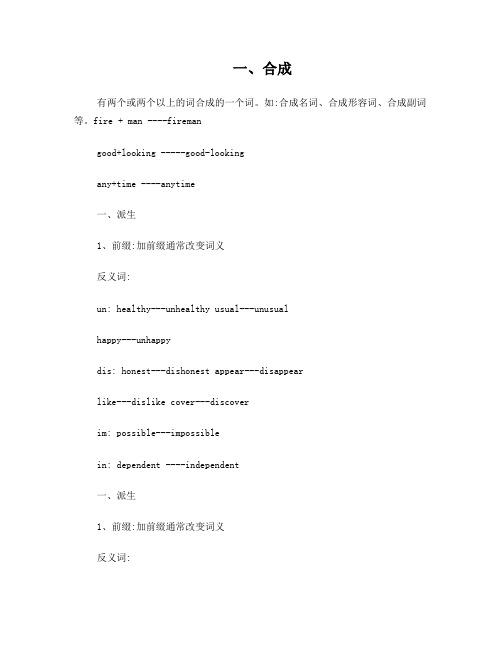
一、合成有两个或两个以上的词合成的一个词。
如:合成名词、合成形容词、合成副词等。
fire + man ----firemangood+looking -----good-lookingany+time ----anytime一、派生1、前缀:加前缀通常改变词义反义词:un: healthy---unhealthy usual---unusualhappy---unhappydis: honest---dishonest appear---disappearlike---dislike cover---discoverim: possible---impossiblein: dependent ----independent一、派生1、前缀:加前缀通常改变词义反义词:un: healthy---unhealthy usual---unusualhappy---unhappydis: honest---dishonest appear---disappearlike---dislike cover---discoverim: possible---impossiblein: dependent ----independent2、后缀:加后缀一般改变词性(1)名词后缀:-er: manage—manager, own---owner, record---recorder report---reporter, teach---teacher, wait---waiterwin----winner, work---worker , write---writer--or: visit---visitor , act---actor, invent---inventor -ress: wait---waitress, act---actress-(t)ion: invent—invention, pollute---pollution, attract—attraction, suggest---suggestioncollect---collection, locate---location,operate---operation, protect---protectionsolve---solution, add---addition2、后缀:加后缀一般改变词性(1)名词后缀:-ation: invite---invitation, organize---organization-(s)ion: discuss---discussion, decide---decision-ment: develop---development, amuse—amusementadvertise---advertisement-ce: enter---entrance-ing: meet---meeting, paint---painting, say---saying begin---beginning, build---building2、后缀:加后缀一般改变词性(2)名词+ist ; er变成表示人的名词-ist: science--scientist, art—artist, tour—tourist-er: farm---farmer, engine---engineer, law---lawyer(3)形容词+ness, ty,ity, th, ce, dom变成名词-ness: kind—kindness, ill—illness;-ty: safe—safety, difficult—difficulty, honest—honesty-ity: electric—electricity, national—nationality,active—activity, able—ability-th: true—truth, long—length-ce:different—difference, important—importance-dom: free—freedom, wise—wisdom,(2) 动词后缀:1.名词+ize变成动词:-ize: memory---memorize2. 形容词+en 变成动词:wide—widen(3). 形容词后缀:1.名词+ed, ful, y, ly, ive, al, cal, en, (i)an变成形容词-ed: age—aged, wound—wounded-ful: power—powerful, care—careful, use—useful success—successful, wonder—wonderful-y: wind—windy, rain—rainy, cloud—cloudysnow—snowy, sun—sunny, luck—luckynoise—noisy, health—healthy, fun—funny,-ly: love—lovely, friend—friendly,-ive: act—active-al: education—educational, office—official, nation—national, nature—natural, person—personal, tradition—traditional, physical—physical-cal: history—historical, chemistry—chemical, medicine—medical-en: gold—golden, wood—wooden-(i)an: Australia—Australian, Canada—Canadian Italy—Italian, America—American(4)名词+less 变成形容词,有相反的意思-less: home—homeless, care—careless, help—helpless life—lifeless, use—useless;动词+ful, able, ive变成形容词:-ful: forget—forgetful, help—helpful, thank—thankful -able: avail—available, enjoy—enjoyable, change—changeable,-ive: attract—attractive动词+ed, ing变成形容词-ed: wound—wounded, fry—fried, please—pleased, surprise—surprised, interest—interested,excite—excited-ing: amuse—amusing, interest—interestingsurprise—surprising, excite--exciting(4)副词后缀:形容词+y, ly 变副词-y: gentle—gently, possible—possibly-ly: accurate—accurately, angry—angrily,beautiful—beautifully, general—generally,clear—clearly, complete—completely, final—finally lucky—luckily, loud—loudly, main—mainly,quick—quickly, quiet—quietly, real—really,recent—recently, usual—usually, safe—safelyslow—slowly, serious—seriously, soft—softlywide—widely, true—truly, careful—carefully,happy—happily, heavy—heavily,immediate--immediately(5)基数词后缀:-teen : four—fourteen, five—fifteen, …-ty: three—thirty, eight—eighty,(6) 序数词后缀:-th: five-fifth, six---sixth, nineteen—nineteenth, ninety-ninetieth, nine—ninth特别注意:one—first—firstly—oncetwo—second—secondly--twice1、make a phone call-----call me later2、change her idea---offer me some changes3、clean our classroom---keep our classroom clean4、be sunny and clear---clear the street5、cook food----a chief cook6、get a thorough check---check our homework7、correct our mistakes---a correct answer8、keep us cool---cool the milk9、in the dark---dark brown10、from a desire to become rich---desire happiness11、leave early-----early morning12、on my other hand----hand me his book13、a hard apple----work hard14、hurry to school ----in a hurry15、look like ----have a look at16、work late ----at a late hour---be late for17、process our problem ---a long process18、water flowers---enough water19、weak light----light enough for me to lift20、walk straight----a straight line21、some books---book a hotel22、break the rules----have a break23、a bright boy----a pair of bright eyes24、a book in a case----deal with a case25、catch the bus---catch the thief—catch a cold---catch what you said26、live in the country----work for our country27、walk through the crowd----be crowded with28、my dear---a dear earring29、my experiences in England----be full of experience30、I don’t know if…,////If it rains,….31、run fast----run a restaurant32、happen to do / happen on Friday33、manage to do sth./ manage a company34、the rest of time / have a rest35、be present a meeting----give me a present----at present36、still live there-----keep still/stay still----still taller37、take away---take notes---take a pill---take a bus----It takes sb. some time to do…-----take photos38、look after patients-----be patient to students39、Yes, I will.-----Will you…..------a strong willWhen there is a will, there is a way.40、by train----train us to be excellent ones41、get along/on with sb. ----- get along /on with our work42、go ahead , you’ll find a school on your right.-----May I ask you a question? Go ahead.43、go in for = take part in------go in for = be fond of44、our plane will take off-------take off your coat45、look up at the Oriental Pearl TV Tower= look up a word in the dictionary46、run/ be out of food--------walk out of the classroom47、put on my coat---put on my glasses----put on a play48、take place= be held; take place= happen。
形容词和副词的转换规则

形容词和副词的转换规则形容词和副词是英语中常见的词性,它们在表达中起着重要的作用。
掌握形容词和副词之间的转换规则可以帮助我们更准确地表达意思。
本文将介绍一些常见的形容词和副词转换规则。
1. 形容词转副词规则:在大多数情况下,形容词可以通过在词尾加上“-ly”来转化为副词。
例如:- quick(形容词)- quickly(副词)- careful(形容词)- carefully(副词)然而,也有形容词具有不规则的转换规则。
例如:- good(形容词)- well(副词)- fast(形容词)- fast(副词)2. 副词转形容词规则:副词转换为形容词时,可以通过在词尾加上“-al”、“-ful”或“-ic”来实现。
例如:- natural(副词)- natural(形容词)- careful(副词)- careful(形容词)- specific(副词)- specific(形容词)3. 形容词和副词形式一样:有一些形容词和副词形式是相同的,它们在用法上没有区别。
例如:- fast(形容词)- fast(副词)- hard(形容词)- hard(副词)- slow(形容词)- slow(副词)需要注意的是,虽然形容词和副词可以相互转换,但在表达意思时,它们可能具有不同的含义和用法。
所以在使用时要根据具体语境进行判断。
4. 副词修饰形容词:副词可以用来修饰形容词,以加强或减弱形容词的程度或强度。
例如:- very good(非常好)- quite interesting(相当有趣)- slightly tired(稍微疲倦)值得注意的是,有些形容词在转换为副词时会发生拼写变化。
例如:- true(形容词)- truly(副词)- due(形容词)- duly(副词)总结起来,形容词和副词之间的转换规则多种多样,需要我们通过大量的阅读和实践来掌握。
熟练掌握这些转换规则可以帮助我们更准确地表达自己的意思,提高英语写作和口语的能力。
- 1、下载文档前请自行甄别文档内容的完整性,平台不提供额外的编辑、内容补充、找答案等附加服务。
- 2、"仅部分预览"的文档,不可在线预览部分如存在完整性等问题,可反馈申请退款(可完整预览的文档不适用该条件!)。
- 3、如文档侵犯您的权益,请联系客服反馈,我们会尽快为您处理(人工客服工作时间:9:00-18:30)。
三.will, be going to …, be to…, be about to…的区别1.be going to +不定式,表示将来。
表示打算、准备做的事或即将发生或肯定要发生的事。
be going to和will相比,be going to通常表示主观,will通常表示客观。
What are you going to do tomorrow? 明天你要做什么?Look at the dark clouds, there is going to be a storm. 看看这些黑云,将有一场暴风雨。
It’s going to be a fine day tomorrow.明天将会是个好天。
It is going to rain. 要下雨了。
2.“be to+动词原形”表示按计划要发生的事或征求对方意见。
这种结构表示计划中约定的或按职责、义务要求必须去做的事或即将发生的动作。
We are to have a meeting next Saturday. 下个周日我们有个会。
The boy is to go to school tomorrow. 这个男孩明天要去上学。
Are we to go on with this work? 我们继续干吗?The president is to visit China next week.总统下周来访中国。
3.“be about to+动词原形”表示即将发生的动作,意为:很快,马上。
后面一般不跟时间状语。
这一结构用于表示客观就要发生的事,表示马上就要发生。
一般不再与时间状语连用。
Don’t go out. We’re about to have a meeting. 别出去了,我们很快就开会了。
I was about to start when it began to rain.我刚要出发就下起雨来了。
He is about to leave for Shenyang.他将要离开去沈阳。
We are about to leave. 我们马上就走。
The film is about to begin. 电影马上就要开始了。
四.注意事项1. be about to 不能与tomorrow, next week 等表示明确将来时的时间状语连用。
2. Let’s …的附加疑问通常使用“…, shall we ?”。
Let’s have a rest, shall we?3. 问句是“Shall…?”,答句就用“shall ~”;问句用“Will …?”,答句就用“will ~ ”。
要前后保持一致。
Shall you go to school next week ?Yes, I shall . We’ll have an exam .Will you have an exam tomorrow?Yes, I will. / No, I won’t.简析also, too, as well和either用法also, too, as well, either,作“也”讲,为副词。
下面分别讲述:一. too, also, as well:都用于肯定句,表示前者怎样后者也怎样。
too:一般放在句尾,可用逗号和前面的句子隔开,也可不用;also:其位置大多放在be动词、助动词、情态动词之后,实义动词之前;as… well:其位置一般放在句尾,三者可以作同义句转换。
例如:You need to go shopping and I need to go shopping, too.=You need to go shopping and I also need to go shopping.=You need to go shopping and I need to go shopping as well.二. either:用于否定句中,表示前者不……,后者也不……,其位置一般放在句尾。
例如:He doesn”t want any coffee, and I don”t want any, either.You don”t know the way and I don”t know it, either.〔巩固训练〕1. He is _____saying,“I don”t want any bread, ____A. too, alsoB. also, tooC. either, tooD. also, either2. I __ study English and Russian .A. too B. also C. either D. as well3. Not only the children but ___their father is in town.A. too B. also C. either D. as well4. John ___ believes that bears hibernate inwinter________________.A. also, eitherB. too, as wellC. also, as wellD. as well, too5. The foreigner can speak English, he can speak French _______.A. neitherB. alsoC. eitherD. as well【参考答案】1. D2. B3. B4. C5. D动词变名词1.在词尾加er,r ,双写加er 或or:A. play _ player, sing _ singer, wait _ waiter , find _ finder,thrill _ thrillerB. write _ writer, drive _ driver, come _ comer, explore _ explorerdance _ dancerC. run _ runner, win _ winner, rob _ robber, traval _ travallerD. visit _ visitor, invent _ inventor2. 在词尾加ing:build _ building, draw _ drawing, end _ ending, begin _ beginning,swim _ swimming,skate _ skating, feel _ feeling, say _ saying,mean _ meaning, cross _ crossing,surf _ surfing, paint _ painting3.在词尾加ion 或去e加ion:A. decide _ decision, describe _ description, produce _ production,celebrate _ celebration,pronounce _ pronunciation, decorate _ decoration graduate _ graduation,frustrate - frustration,pollute _ pollutioncontribute _ contribution, congratulate _ congratulation,educate _ education,organize _ orgnization,donate _ donation,appreciate _ appreciation,operate _ operation, invite _ invitationB. discuss _ discussion, invent _ invention, attract _ attractionimpress _ impression,inject _ injection,instruct _ instruction4.其它:know _ knowledge, please _ pleasure, enjoy _ enjoyment,practise _ practice,die _ death, succeed _ success, weigh _ weight,sit _ deat, change _ chance,enter _ entrance,fly _ flight,rob _ robbery, discover _ discovery,faile _ failure,appear _ appearance,breathe _ breath动词变形容词第一,后面加able,afford-affordable;以e结尾的动词则去e加able,love-lovable:表示具有此性质、特点或属性。
第二,后面加ed,scatter-scattered;以e结尾的动词则直接加d,use-used:表示被动性的属性或特点。
第三,不规则的动词则必须记忆,记住其过去分词形式规律不大,意义同上。
第四,后面加ing,run-running,die-dying,变为现在分词形式,有的去e加ing,有的双写加ing,有的改为y加ing,规律同现在分词,表示有正在主动的进行的属性或特点。
1.词尾加ful:use - useful, care - careful, help - helpful,thank - thankfulpeace - peaceful, forget - forgetful, play - playful,succeed - successful, wonder - wonderful2.词尾加d或ed:please - pleased, unite - united, excite - excited,surprise - surprised, organize - organized, close - closed,wound - wounded, relax - relaxed,develop - developed,appreciate - appreciated,frustrate - frustrated,interest - interested, annoy - annoyed, use - used,frighten - frightened, crowd - crowded, thrill - thrilled,pollute - polluted3.词尾加ing:interest - interesting, surprise - surprising, excite - exciting develop - developing, frighten - frightening,thrill - thyrilling frustrate - frustrating, relax _ relaxing, live - livingrock - rocking, sleep - sleeping4.词尾变y为i,加ed:worry - worried, marry - married,fry - fried, terrify - terrified satisfy - satisfied5.词尾加able:know - knowledgeable, enjoy - enjoyabe,suit - suitableadjust - adjustable, comfort - comfortable6.其它:lose - lost, fool - foolish, live - lively / alive /living,sleep - sleepy / sleeping / asleep,wake - awake, taste - tasty speak - spoken, break - broken, die - dead, educate - aducational, world - worldwide形容词变副词规律小结。
